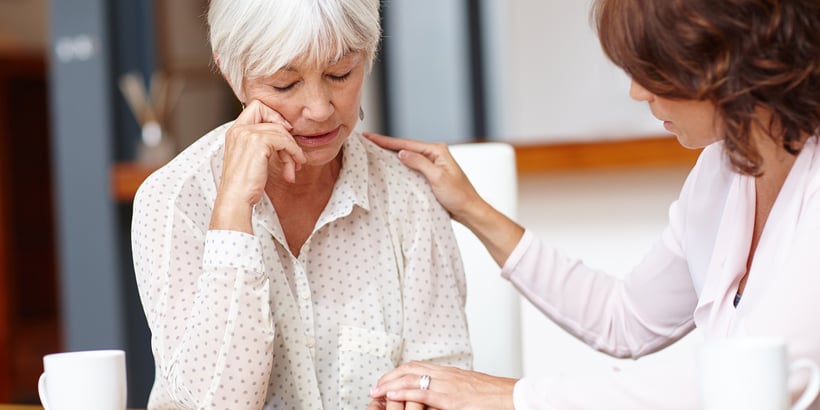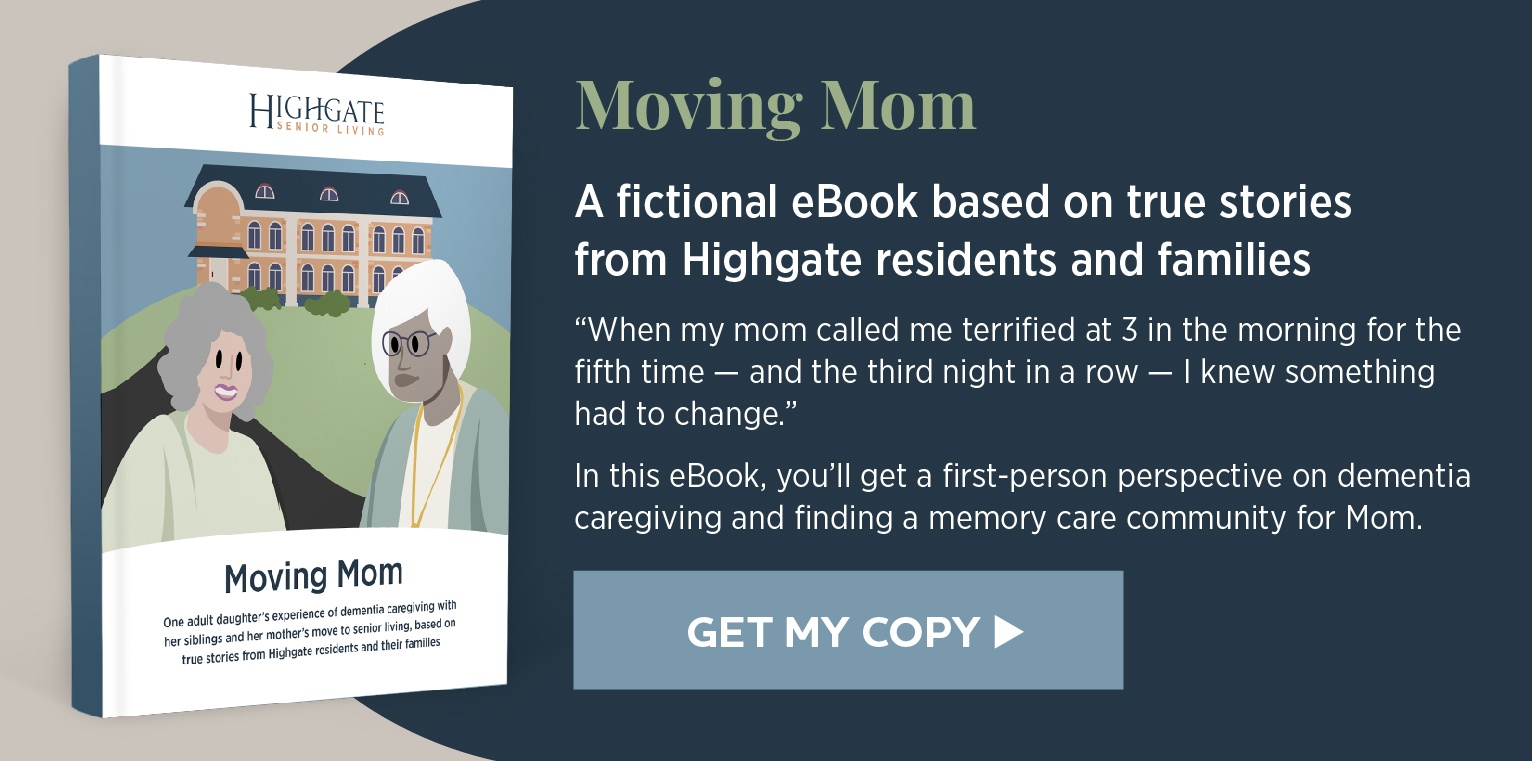
Does your mom have a pattern of calling multiple times during the night? Has she stopped running to the store or driving herself to doctor appointments?
Just like childhood fears are a normal part of growing up, many older women who live alone also develop persisting fears and anxiety as they age.
Perhaps it’s sounds outside their home that produces nighttime anxiety, restlessness, and a feeling of not knowing what to do. Or maybe your mom is concerned, night after night, that she’s going to miss her weekly hair appointment.
Studies show that many older women fear being alone. These fears aren’t only anxiety-provoking, these feelings of loneliness and emptiness are associated with a variety of illnesses, including cardiovascular problems, decreased cognitive function, sleep disturbance, and unhealthy behaviors, such as smoking and drinking alcohol. Over time, many older people with high anxiety opt to stay at home or interact only with close neighbors, further contributing to their isolation.
Even if your mom’s fears strike you as irrational, paranoid, absurd, or ridiculous, they have real consequences. Instead of trying to convince her that nothing is there, see if you can figure out what might be triggering her fear about living at home alone. No matter your mom’s age or mental condition, people respond to feeling heard and loved.
Here’s a look at four common reasons why your mom might be feeling anxious about living at home alone.
Fear of Being Alone
Imagine entering a dark house without anyone waiting for you. You might spend the rest of the night thinking about your past, particularly times of struggle, and worrying about the future.
Here are some comments older women made when asked to describe situations where they felt anxious when living alone:
“Sometimes, I get around and I go home late. When I go home and open the door, there is no one there. It′s a bit lonely because there is no one to wait.”
“I am lonely, anxious, and nervous when I am at home alone in the evening. Then I get the feeling that I’m depressed.”“I’m never at home. If I′m at home, I′m bored. But if I go outside, it’s OK. I just go around the park. There are strangers in the park. I do not know anyone there but I sit alone among these strangers, listening to their stories and spending time, and then come home.”
Alzheimer’s and other types of dementia can also contribute to fear at night. For example, if your mom has a form of dementia, then she might wake up at night in a confused state, often not knowing where she is or whom she’s with.
Fear of Falling
As you age, the fear of falling starts to creep into your thoughts more and more. Why? Because falling could mean injuries that are not only painful but that also make it hard to get around, do everyday activities, or live on your own.
Many older women worry about falling and the consequences of a fall — even if they haven’t fallen yet. It’s likely that they have a friend or neighbor who has fallen or have heard stories of someone who fell, broke their hip, and never recovered. An older adult is treated in an emergency room for a fall every 11 seconds. No wonder 30% to 50% of elderly people fear falling more than they fear financial problems, forgetting an appointment, or being scammed or robbed.
The problem is that if your mom is anxious and afraid of falling, she might stop doing things and withdraw from life. During the day, she might refuse to walk outside of the home unassisted or avoid leaving the home altogether. During the night, when the lack of light increases the risk for accidents, she might feel even more hesitant about being at home alone. This general loss of confidence can further contribute to depression, isolation, and feelings of helplessness.
Fear of Driving
Has driving become a stressful, confusing, or exhausting activity for your mom?
Perhaps it’s a fear of getting into an accident that keeps her at home, at the mercy of public transportation schedules, or reliant on you and other family members to make sure she gets to the doctor or to the grocery store. Or maybe she didn’t tell you about finding her keys in the freezer or getting lost on her drive home from church to keep you from worrying she’s losing her memory.
Studies show that nearly half (47%) of older women drivers report some level of driving anxiety, compared to only 28% of the men. This driving anxiety can range from driving reluctance to driving phobia and other types of anxious distress that can have an impact on functioning.
When driving anxiety leads to premature driving retirement, it can have serious consequences for older women, including depression, social isolation, as well as functional and health decline.
Fear of Being a Burden
No matter your age, it’s not easy asking for help with things you were once capable of handling and managing yourself — especially if your mom was the matriarch of the family. Nearly 50 percent of aging parents say they’re worried about being a burden to their children.
Maybe your mom feels guilty every time you leave work to take her to a doctor appointment. Perhaps she’s noticed that you’re overloaded with to-dos when you stop by her house for your weekly dinner.
She might be worried about complicating your already busy life. She is still your mom after all. She worries about you and your own health and happiness — and she doesn’t want to burden you with her problems when you have a complicated life of your own.
Fear Is a Powerful Motivator
Fear of living at home alone was a powerful motivator for one aging mom in the early stages of dementia and her adult daughter.
At first, her mom shared stories she heard on the news or read in the paper about break-ins in nearby neighborhoods. She put new locks on all the doors, which helped for a little bit, but sometimes she’d get spooked by sounds outside the home. Her mom started sleeping with a bright lamp on all night. Now it’s been weeks (if not months) since she really has gotten a good night’s sleep, so she ends up napping on the couch during the day to catch up.
It’s not just the mom who’s afraid. Her daughter worries all the time: She’s worried that her mom will slip in the bathroom and break a hip. She’s worried that her mom is going to leave the stovetop on and burn the house down. She’s worried that her mom is going to walk out the front door and not come home. She’s worried that her mom is going to keep withdrawing so much that she basically disappears. She’s worried about the things she doesn’t even know to be worried about yet!
Recently, her mom called her adult daughter in sheer panic, yelling, “Help me, Susan, there’s a man here in my bedroom, and I don’t know what to do!” The man was Susan’s brother, who was staying with their mom while he was in town.
Sound familiar?
In Moving Mom, you’ll read one adult daughter’s experience of dementia caregiving with her siblings and her mother’s move to senior living, based on true stories from Highgate residents and their families. It dives deeper into loneliness, fear of falling, and quality of life in older women who live alone; navigating dementia caregiving with siblings; and making the move to a memory care community.






